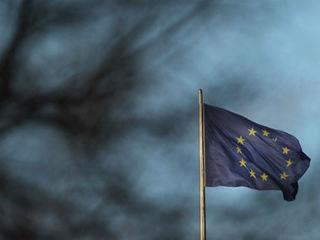With the European Union’s 60th birthday upon us, it seems appropriate to look ahead to the next 60 years: what will Europe look like in 2077?

Europe is ageing and shrinking, and it is also falling behind in key wealth-creation areas like technological innovation and productivity. By the middle of this century, Europeans will be little more than four percent of a world population projected by the United Nations to reach possibly 11 billion people. Europe will be so elderly that the ratio of workers to pensioners will have shrunk to two-to-one from today’s four-to-one.
by
Giles Merritt*
An alpine valley springs to mind. The years since the signing of the Treaty of Rome are sunlit meadows that stretch gently downhill. The six people strolling along the slope are quite soon joined by three more, even if one of them seems reluctant and a bit sulky. With a pleasant breeze at their backs, the going is fairly easy.
More smiling faces join them, talking animatedly and even linking arms. Now fifteen-strong, their ranks are eventually swelled by another ten, then by two more, and finally by a single newcomer. On reaching the valley floor, though, they discover that the other side is a very different proposition.
It is steep and strewn with rocks. The climbers, reduced to 27, are forced to place their feet with care. The difficult terrain, and the much colder wind blowing directly into their faces, makes conversation difficult. Lacking a strong leader, the band’s members become increasingly strung out from one other as they toil upwards.
These boulders and awkward rock formations are the structural problems ahead of Europe, which public opinion throughout the EU is either unaware of or reluctant to acknowledge. The wind hampering the climbers is the globalising economic climate.
Europe is ageing and shrinking, and it is also falling behind in key wealth-creation areas like technological innovation and productivity. By the middle of this century, Europeans will be little more than four percent of a world population projected by the United Nations to reach possibly 11 billion people. Europe will be so elderly that the ratio of workers to pensioners will have shrunk to two-to-one from today’s four-to-one.
The present EU workforce of 240 million people will, on present trends, be down to 207 million. This places a 1.3% ceiling on maximum possible annual GDP growth, down from the present 1.8%. But if populist-fuelled anti-immigration pressures were to cut off the inflow of young blood into Europe, the combined workforces of the EU and the UK would, by 2050, number only 169 million. That would be an economic body blow.
The answer, as informed policymakers are well aware, is to open Europe’s doors much wider to newcomers. More than a decade ago, a report by former Spanish prime minister Felipe Gonzalez warned that 100 million newcomers are needed by mid-century if the European economy is not to be throttled by labour shortages. It’s a message vote-seeking politicians don’t like to repeat, not least because of rising fears linking immigration to Islamic terrorism.
Nevertheless, unless EU countries import tomorrow’s missing workers, educate and train them, and integrate them socially and economically, the outlook will be bleak.
But doing so would require a dramatic change in Europeans’ mindsets. Some, perhaps many, will resist the idea of welcoming economic migrants from Africa and the Arab world. They argue that industrialised, high-tech Europe has an unchallengeable head-start in the global economy.
Sadly, that’s no longer the case. When 500 of Europe’s corporate bosses were surveyed a few years ago by Accenture consultants, they saw 2023 as the point when Asia’s scientists overtake Europe’s. China’s copycat years of chasing Western innovations are coming to an end. And on productivity, a key to international competitiveness, the EU now trails far behind the United States and others, despite having been well ahead during the closing decades of the 20th century.
As European leaders gather in Rome to celebrate the EU’s impressive political and economic achievements, they will also be looking to the future in light of the five scenarios set out in the European Commission’s recent White Paper.
Forging consensus in a Union fraught with tensions and deep-seated disagreements isn’t going to be easy. Its difficulties must, however, be set against the image of those wind-battered climbers as they try to thread their way between the boulders blocking their path.
*Founder & Chairman of Friends of Europe


